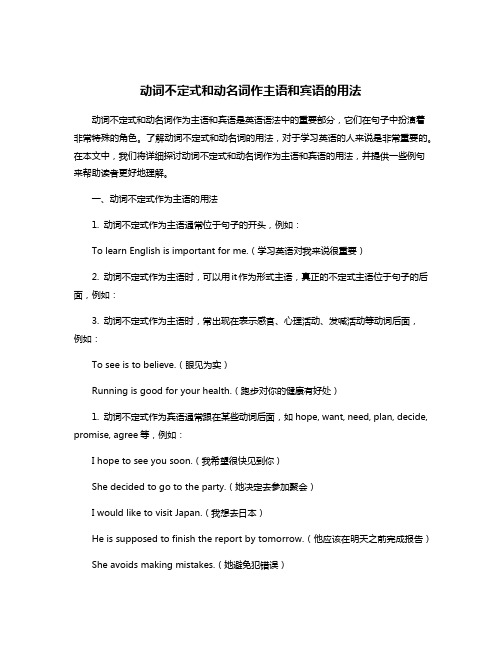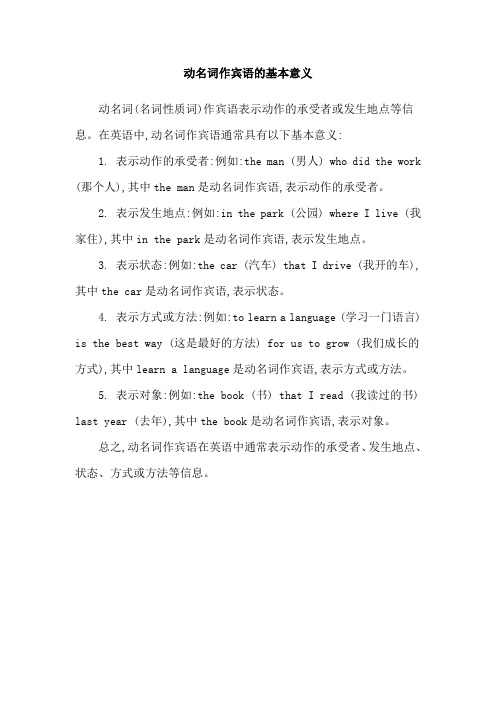动名词作宾语
动名词作主语和宾语ppt课件

deny (否认), quit (停止),excuse/pardon (原谅)
resist(抵抗) ,forbid(禁止) feel like(想要) 8
2)某些短语(特别是某些含有介词的短语) 后,需要用动名词作宾语。类似的常用短语 有:
His being late made me angry. 2) 作动词或介词的宾语
Do you mind my/me smoking?
I insist on Mary’s/Mary going there. 我坚持要玛丽到那儿去。
I heard of your/you being ill. 我没听说你病了16。
一般式的主动语态:doing 一般式的被动语态: being done 完成式的主动语态: having done
完成式的被动语态: having been done 图解如下:
18
动名词的时态和语态
一般式
完成式
主动形式
doing
having done
被动形式
being done
having been done
It’s a waste of time waiting here. 在这里等着是浪费时间。
2) 用于there be 结构中
There is no point (in) doing… 做…是没有意义的
There’s no point (in) getting angry.
发火没有意义。
4
3)动名词的复合结构作主语 Tom’s coming surprised us. His being careless led to the accident. 4)用于布告形式的省略结构中。
动名词作宾语口诀

动名词作宾语经典口诀考虑建议盼原谅承认推迟没得想避免错过继续练否认完成就欣赏禁止想象才冒险不禁介意准逃亡难以忍受始反对想要成功坚持忙习惯放弃有困难导致专心防道歉解析:第一句包含的动词有:consider,suggest/advise,lookforwardto,excuse/pardon,第二节包含的动词有:admit,delay/putoff,fancy,第三句包含的动词有:avoid,miss,keep/keepon,practice,第四句句包含的动词有:deny,finish,enjoy/appreciate,第五句包含的动词有:forbid,imagine,risk第六句包含的动词有:can'thelp,mind,allow/permit,escape.第七句包含的动词有:can'tstand(难以忍受),setabout开始,着手,objectto,第八句包含动词有:feellike(想要),succeedin(成功),stickto(坚持),insiston (坚持,强调,坚决要求),bebusy(in)(忙于做某事)第九句包含的动词有:beused/accustomedto(习惯于……),giveup(放弃),havedifficulty/trouble(in),(做某事有困难)第十句包含的动词有:leadto(导致),devoteto(将…奉献给;把…专用于),prevent……from……(预防,防止),apologizefor(为……道歉),,此外,haveagood/wonderful/hardtime(in),spendtime(in),thankyoufor,payattentionto,a imat目的在于,旨在;瞄准;企图,accuse…of…控告;谴责,getdownto(着手某事),allow,understand,resist(抵制、抵抗),It'snousedoingsth,thereisnopoint(in)doingsth.etc.注意:(1).advise,allow,forbid,consider后面不可以接不定式,但可以接不定式做宾语补足语,即:advise/allow/considersb.todosth.建议/允许/考虑某人做某事。
动词不定式和动名词作主语和宾语的用法

动词不定式和动名词作主语和宾语的用法
动词不定式和动名词作为主语和宾语是英语语法中的重要部分,它们在句子中扮演着非常特殊的角色。
了解动词不定式和动名词的用法,对于学习英语的人来说是非常重要的。
在本文中,我们将详细探讨动词不定式和动名词作为主语和宾语的用法,并提供一些例句来帮助读者更好地理解。
一、动词不定式作为主语的用法
1. 动词不定式作为主语通常位于句子的开头,例如:
To learn English is important for me.(学习英语对我来说很重要)
2. 动词不定式作为主语时,可以用it作为形式主语,真正的不定式主语位于句子的后面,例如:
3. 动词不定式作为主语时,常出现在表示感官、心理活动、发喊活动等动词后面,
例如:
To see is to believe.(眼见为实)
Running is good for your health.(跑步对你的健康有好处)
1. 动词不定式作为宾语通常跟在某些动词后面,如hope, want, need, plan, decide, promise, agree等,例如:
I hope to see you soon.(我希望很快见到你)
She decided to go to the party.(她决定去参加聚会)
I would like to visit Japan.(我想去日本)
He is supposed to finish the report by tomorrow.(他应该在明天之前完成报告)
She avoids making mistakes.(她避免犯错误)
The movie is worth watching.(这部电影值得一看)。
动名词作宾语的基本意义

动名词作宾语的基本意义
动名词(名词性质词)作宾语表示动作的承受者或发生地点等信息。
在英语中,动名词作宾语通常具有以下基本意义:
1. 表示动作的承受者:例如:the man (男人) who did the work (那个人),其中the man是动名词作宾语,表示动作的承受者。
2. 表示发生地点:例如:in the park (公园) where I live (我家住),其中in the park是动名词作宾语,表示发生地点。
3. 表示状态:例如:the car (汽车) that I drive (我开的车),其中the car是动名词作宾语,表示状态。
4. 表示方式或方法:例如:to learn a language (学习一门语言) is the best way (这是最好的方法) for us to grow (我们成长的方式),其中learn a language是动名词作宾语,表示方式或方法。
5. 表示对象:例如:the book (书) that I read (我读过的书) last year (去年),其中the book是动名词作宾语,表示对象。
总之,动名词作宾语在英语中通常表示动作的承受者、发生地点、状态、方式或方法等信息。
英语动名词语法讲解:动名词作主语、表语、宾语

英语动名词语法讲解:动名词作主语、表语、宾语动名词兼有名词、动词、形容词、副词的性质,能广泛充当主语、表语、宾语、宾补、状语、定语。
1.有30多个常用动词(-ing)后面必须用动名词作宾语,不能用不定式,因为动名词(-ing)的时间含义(同时,任何时)能与这些动词的时间相一致,而不定式(表将来)在时间上与这些动词相矛盾。
2.有些动词后面接动名词(-ing)和不定式均可以,意思也没有什么差别。
start doing/ to do sth.开始做某事begin doing/ to do sth.开始做某事continue doing/ to do.继续做某事3.有些动词后面可以接动名词或者不定式作宾语,但意思有些差异。
常见的动词:like, love, hate, prefer, learn…We like swimming, but we don’t like to swimthisafternoon.我们喜欢游泳,但今天下午不想游。
(like swimming指“经常性的喜欢”,like to swim指“一次性喜欢”)She loves dancing.她喜欢跳舞。
She loves to dance tonight.她今晚喜欢跳舞。
I learned swimming.我学过游泳。
I learned to swim.我学了下游泳。
4.有些动词后接动名词或者不定式在意思上相差很大。
常见的这类动词有:remember, forget, regret…I remember posting the two parcels.我记得已寄走两个包裹。
(动名词表示过去)I remember to post the two parcels.我记得要寄两个包裹。
(不定式表示将来)He regrets offending three classmates.他后悔得罪了3个同学。
(已得罪)He regrets to offend three classmates.他很遗憾要得罪3个同学。
接动名词作宾语的动词

习惯上接动名词作宾语的动词【附记忆口诀】其后习惯上要跟动名词作宾语的常见动词有以下51个:acknowledge, admit, appreciate, avoid, burst out, consider, contemplate注视,凝视,盘算,计议,周密考虑, delay延期,推迟,耽搁, defer使推迟,使延期,拖延,推迟,[军]使延期入伍, deny.拒绝,拒绝承认, detest憎恶,嫌恶,痛恨, dislike, dispute辩论,争论, endure忍受,忍耐, enjoy, evade逃避,规避,逃脱, escape逃脱,(气体,液体等)漏出,(未受伤或只受了一点伤害而)逃脱,声音(不自觉地)由……发出, excuse, face, fancy想像,设想,想要,猜想, feel like 摸起来像是…,有…的感觉,想要…, finish, forgive, give up, grudge怀恨,妒忌,吝惜,不情愿做, (can’t) help, hinder阻碍,妨碍,成为阻碍, imagine, include, involve, keep (on), leave off, mention, mind, miss, necessitate .使…成为必要,需要,强迫,迫使, pardon, postpone .使延期,延缓, practise, prevent, put off, recall, recollect记起,想起, repent对(自己的所为)感到懊悔或忏悔, resent对……感到愤怒,怨恨,愤恨,厌恶, resist, risk, (can’t) stand, stop, suggest, understand 等。
如:用法举例:He admitted having taken the money. 他承认拿了那笔钱。
It was impossible to avoid being affected. 要想不受影响是不可能的。
动词不定式与动名词作宾语的区别
动词不定式与动名词作宾语的区别英语中有的及物动词只能跟动名词作宾语;有的及物动词只能跟动词不定式作宾语;但也有及物动词的宾语既是动名词又是动词不定式。
区别在于:一、在want,decide,promise,refuse,agree,wish,hope,expect等及物动词后面的宾语只能是动词不定式,不是动名词。
如:1.I want to have a talk with her.我想跟她谈谈。
2.Our teacher decided to stay with us.老师决定留下来与我们在一起。
3.My English teacher promised to lend some books to me.我的英语老师答应借给我一些书。
4.My mother refused to go there with us.我妈妈拒绝和我们一起去那里。
二、在一些动词后要求只跟动名词作宾语:1、在finish,enjoy,mind,suggest,practise,admit承认advise建议allow允许appreciate 感激,avoid避免,consider考虑,delay推迟,deny 否认,discuss 讨论,dislike 不喜欢,enjoy 喜爱,escape 逃脱,excuse 原谅,fancy 设想,finish 完成,forbid 禁止,forgive 原谅,give up 放弃,imagine 想像,keep 保持,mention 提及,mind 介意 miss 没赶上,pardon 原谅,permit 允许,practise练习,prevent 阻止,put off 推迟,report 报告,risk 冒险,stop 停止,suggest 建议,understand 理解。
1.I advise waiting a few more days. 我建议再等几天。
2.I admit breaking the window. 我承认窗子是我打破的。
后面接动名词作宾语的所有动词汇总
一、后面接动名词作宾语的所有动词汇总下面的动词要求动名词作宾语:动词+动名词(作宾语)acknowledge承认,自认cease 停止mention说到,讲到admit 承认tolerate忍受dislike不喜欢,讨厌advocate:提倡,主张complete完成dread可怕appreciate 感激,欣赏confess坦白endure忍受avoid避免contemplate细想enjoy享有,喜爱bear忍受defer拖延envy嫉妒can't help不禁delay延迟escape逃跑,逃避can't stand受不了deny否认excuse借口consider 考虑detest嫌恶fancy幻想,爱好favor 造成,偏爱mind 介意repent悔悟figure描绘,计算miss错过resent怨恨finish完成,结束不得pardon原谅,饶恕resist抵抗,阻止forgive原谅permit 允许resume恢复imagine设想postpone延迟,延期risk冒险involve卷入,包含practise 实行,实践suggest建议hate讨厌prevent阻止save营救,储蓄keep保持quit放弃停止stand坚持,忍受loathe非常讨厌,厌恶recall回想例如:I appreciate having been given the opportunity to study abroad two years ago.我很感激两年前给我出国学习的机会.(3)有些动词后使用动名词和动词不定式作宾语的差别(1)forget to do 忘记要去做某事(此事未做)forget doing忘记做过某事(此事已做过或已发生)2)stop to do 停止中断(某件事),目的是去做另一件事stop doing 停止正在或经常做的事3)remember to do 记住去做某事(未做)remember doing记得做过某事(已做)4) regret to do对要做的事遗憾regret doing对做过的事遗憾、后悔5)try to do努力、企图做某事try doing试验、试一试某种办法6) mean to do打算,有意要…mean doing意味着7)go on to do 继而(去做另外一件事情)go on doing 继续(原先没有做完的事情)8)propose to do 打算(要做某事)proposing doing建议(做某事)9) like /love/hate/ prefer +to do 表示具体行为;+doing sth 表示抽象、倾向概念(注)如果这些动词前有should一词,其后宾语只跟不定式,不能跟动名词.例如:I should like to see him tomorrow.10) need, want, deserve +动名词表被动意义;+不定式被动态表示“要(修、清理等)”意思.Don't you remember seeing the man before?你不记得以前见过那个人吗?You must remember to leave tomorrow.你可要记着是明天动身.I don't regret telling her what I thought.我不后悔给她讲过我的想法.(已讲过)I regret to have to do this, but I have no choice.我很遗憾必须这样去做,我实在没办法.(未做但要做)You must try to be more careful.你可要多加小心.Let's try doing the work some other way.让我们试一试用另外一种办法来做这工作.I didn't mean to hurt your feeling.我没想要伤害你的感情.This illness will mean (your) going to hospital.得了这种病(你)就要进医院.(一)动名词与不定式的区别动名词起名词作用,在句子中可以作主语、宾语、表语、定语、主语补足语、宾语补足语.不定式起名词、形容词、副词作用,在句子中除了动名词所起的作用外,还可以作状语.但两者之间也有差别:1. 不定式的逻辑主语必须与主语一致,而动名词的逻辑主语范围较大,它可以指主语,也可以是泛指.如:I hate to work on weekends. 我讨厌周末干活.(指自己干活)I hate working on weekends. 我讨厌周末干活.(可以指自己,也可以泛指)2. 动名词多指抽象的、概念性的动作,可以是多次的、经常的行为;不定式多表示具体的动作,尤其是某一次的动作.如:Reading in bed is a pleasure. 躺着看书是一种乐趣.I like swimming but I don't like to swim in the pool today. 我喜欢游泳,但是今天我不喜欢在游泳池里游泳.试比较:Playing with fire is dangerous. 玩火危险.(泛指玩火)To play with fire will be dangerous. 玩火会发生危险.(指一具体的动作)Talking for hours is more exhausting than you think. 一连讲几小时的话会比你想像的要累.(泛指讲话)To talk for hours is more exhausting than you think. 一连讲几小时的话可比你想像的要累.(指个人感受)3. 在某些动词之后只能用动名词,而另一些动词之后只能用不定式. 常后接动名词的动词有:admit, avoid, consider, defer (推迟,延期),delay,deny, dislike,enjoy,escape, fancy,finish,imagine,include,keep,mind,miss,postpone (推迟,延期),practise,recall,recollect,resent, resist, risk, stop, suggest等〇常后接动名词短语动词有have done, give up等.常后接不定式的动词有:afford, agree, aim, ask, claim,choose,decide, decline, demand, desire, determine, expect, fail, hope, manage, offer, plan,pretend, promise, refuse, resolve, threaten,wish等.4. 有不少动词既可后接动名词也可接不定式.常见的有begin,continue, dread,fear,forget,go on, hate, help, intend, leam, like, love, mean, need, neglect, proceed, propose, regret, remember, start, stop, try, want等.这些动词后接的动名词与不定式在意义上往往没有什么区别.但有时两者的意义却有不同:(1) remember和forget后接不定式时,表示没有发生的动作,而接动名词时,表示已经发生过的动作.如:I remember doing that thing. 我记得做过那件事.I remember to do that thing. 我记着要去做那件事.I forgot to lock my door when I left the room. 当我离开房间时,我忘记锁门了.I forgot locking my door when I left the room. 我忘记了我离开房间时已把门锁上了.(2) stop接动名词,表示“停止正在做的事”;stop后接不定式表示“停下来去做某事”,该不定式不是宾语,而是目的状语.如:You'd better stop smoking. 你最好不要吸烟了.Stop to listen to the teacher. 停下来听老师讲.(3)try接不定式,表示“努力做某事”;try接动名词,表示“尝试做某事”.如:Try to do it again, you'll finish it. 努力再试一次,你就会完成的.They try reading the story in English. 他们试着用英语读那个故事. (4) regret后接不定式时,指将来或现在的动作;regret后接动名词时,指过去或现在的动作;regret后接动名词的完成式时,指过去的动作.如:I regret telling you the bad news. 我后悔把这个坏消息告诉你.I regret to say I'm unable to help you. 很抱歉我不能帮助你.(5)help后接动名词意谓“避免”,help后接不定式意为“帮助”.如:I can't help laughing. 我不禁笑起来.I can't help to clean up the place. 我不能帮忙打扫这地方.(6)mean后接动名词意为“意味着”,mean后接不定式意为“打算”.如:Doing morning exercises means getting up early. 做早操意味着要早起.I meant to help you. 我意在帮你.5. 有些动名词的主动式可表达被动意义,而不定式则须用其被动式表达被动意义.如:我不堪被人想念.I won't bear thinking of.I won't bear to be thought about.它需要修理.It needs repairing.It needs to be repaired.6. 有些动词在书面语中后多接动名词,在口语中后多接不定式.如:开始下雨了.It started raining.It started to rain.我害怕冒犯她.I fear offending her.I fear to offend her.7. 在should (would) like, love等之后须用不定式.如:I'd like to thank you again. 我愿再次感谢你.I'd love to come sometime. 日后我愿意来的.。
不定式或动名词作动词宾语的用法
不定式或动名词作动词宾语的用法在第十单元我们学习了不定式的句法功用,可以看出,不定式和动名词都可以作主语、宾语、表语、定语和补语。
作主语和表语时,动名词形式表示一般的、概念性的、时常的动作,而动词不定式常表示一时的、偶然的行为和动作。
如:Being a doctor is a good choice.当医生是不错的选择。
(对任何人、任何时候而言都是这样的)To be a good doctor is my dream.当个好医生是我的梦想。
(对个人而言,是个别情况)用动名词还是不定式作宾语,主要分为以下四种情况:(1)只可使用动名词作宾语的动词:enjoy,miss,practice,prefer,suggest,consider,appreciate,avoid,mind,imagine,finish ,admit,deny,delay,risk等。
只跟动名词的短语:feel like,stick to,devote to,pay attention to,be worth,be busy,can’t help,it is no use,be used to (习惯于),look forward to,can’t stand等。
(2)只可使用不定式作宾语的动词:wish,hope,promise,expect,pretend,want,agree,refuse,prepare,manage,persuade, afford,offer,attempt,decide等。
只跟不定式的习语:would like/love to等。
(3)既可接动名词,又可接不定式作宾语的动词有:start,begin,continue,like,love,hate等,意思基本没有区别。
love,like和hate接动名词和不定式时,表示长久的、规律性的好恶用动名词,表示一时的、个别性的好恶常用不定式。
如:He hate eating fish from his childhood.他从小就不喜欢吃鱼。
动词不定式和动名词作宾语
动词不定式和动名词作宾语动词不定式和动名词均可在及物动词后面作宾语,但在使用过程中应注意以下几点:一、依照惯用法,agree,choose,decide,hope,fail,wish,refuse,expect,manage,plan,intend, pretend, promise, offer, afford, demand和arrange等及物动词后面常接动词不定式作宾语。例如:What did they decide to do?他们决定干什么?I hope to be back soon.我希望早点回家。二、依照惯用法, finish, enjoy, mind, keep, miss, avoid, consider, imagine, practise, delay,escape, excuse, allow, suggest等及物动词后面常接动名词作宾语。例如:We canfinish buildingthe bridge before the end of nextmonth.我们可以在下个月底之前建好这座桥。Would you mind opening the window?请您开一下窗户,好吗?三、依照惯用法, prefer,hate, begin,start, continue, cease等及物动词后面跟动词不定式与跟动名词作宾语,意义上没有多大的差别。例如:After the teacher left the classroom, the students began to do/doing their homework.老师离开教室后,学生们开始做作业。They continued to read/reading English.他们继续读英语。但在下列情况下,宜用动词不定式作宾语,而不用动名词。1. like, love, prefer, hate等与would或should连用时。例如:I’d prefer to stay home to watch TV.我宁可呆在家里看电视。2. begin, start, continue等本身用的是进行体时。例如:She was starting to do her homework.她开始做作业。3. begin, start, cease, continue的主语是物而不是人时。例如:It began/started to rain.天开始下雨。The ice ceased to melt(融化) in winter.冬季冰不再融化。4. begin等及物动词后接know, understand, realize等表示心理状态的动词。例如:They began to realize theimportance oflearning aforeignlanguage well.他们开始意识到学好一门外语的重要性。四、下列动词后面既可接动词不定式作宾语,也可接动名词作宾语,但两种结构的意义有区别:1. rember,forget, regret等后接动词不定式作宾语时,说明动词不定式表示的动作发生在后, rember等动词表示的动作发生在前;这些动词后接动名词作宾语时,说明动名词表示的动作发生在前, rember等动词表示的动作发生在后。试比较:Shetoldme togo andlock the door. She didn’t remberlocking the door after supper.她叫我去锁门,她不记得晚饭后锁过门了。Rember to turn off all the lights when you leave the classroom.你离开教室时,别忘记把所有的灯关掉。2. try, mean, can’t help,go on等动词后接动词不定式和动名词时,意义有明显的差别:1) try后面的动词不定式是作目的状语,tryto do sth意为“尽力做某事”; try 后面的动名词是作宾语, try doing sth意为“尝试做某事”。例如:He tried not to be late for the meeting.他争取开会不迟到。The soup is a little salty. Try adding some water to it.汤咸了点,加点水试试看。2)mean后面的动词不定式和动名词都是作宾语。meantodosth意为“打算(意图)做某事”; mean doing sth意为“意味着做某事”。例如:They didn’t mean to go an d help you.他们不打算去帮助你们。Hiswordsmeantgoingtohelpyouwithoutdelay.他的话意味着他将毫不迟疑地前去帮助你们。3) help后面的动词不定式和动名词都是作宾语。can’t help to do sth意为“不能帮忙做某事”; can’t help doing sth意为“禁不住去做某事,情不自禁地做某事”。例如:I’m sorry I can’t help to clean the room.对不起,我不能帮助打扫房间。They couldn’t helplaughingwhen theyheard the joke.听到这个笑话,他们不禁大笑起来。4) go on后面的动词不定式是作目的状语。go on to do sth意为“接下去做另一件事”;go on后面的动名词是作宾语。go on doing sth意为“继续做同一件事”。例如:They went on to do some exercises after reading the text.读完课文后,他们接着做练习。We went on doing our homework after he left.他走后我们继续做作业。五、need, want, require等动词后面跟动名词的主动形式和跟动词不定式的被动式,都表示被动意义。试比较:Your house needs repairing/to be repaired.你的房子需要维修。The problem requires solving/to be solved immediately.这个问题需要立即予以解决。六、stop之后的动名词为宾语, stop之后的动词不定式为目的状语。试比较:We stopped working.我们停止工作。We stopped to have a rest.我们停下来休息一下。When it began to rain, we stopped working to have a rest.天开始下雨,我们停止工作,休息一下。在英语中,某些动词后面只能跟动词不定式作直接宾语。
- 1、下载文档前请自行甄别文档内容的完整性,平台不提供额外的编辑、内容补充、找答案等附加服务。
- 2、"仅部分预览"的文档,不可在线预览部分如存在完整性等问题,可反馈申请退款(可完整预览的文档不适用该条件!)。
- 3、如文档侵犯您的权益,请联系客服反馈,我们会尽快为您处理(人工客服工作时间:9:00-18:30)。
动名词作宾语
有些动词须用动名词来作宾语,它们是begin, mind, suggest, finish, stop, need,
enjoy, miss, keep.
动词后加动名词doing作宾语 V. + doing sth
admit 承认 appreciate 感激,赞赏 avoid 避免
complete 完成 consider 认为 delay 耽误 deny 否
认 detest 讨厌 endure 忍受 enjoy 喜欢 escape 逃
脱 prevent阻止
fancy 想象 finish 完成 imagine 想象 mind 介
意 miss 想念 postpone 推迟 practise 训练
recall 回忆 resent 讨厌 resist 抵抗 resume 继
续 risk 冒险
suggest 建议 face 面对 include 包括 stand 忍受
understand 理解 forgive 宽恕 keep 继续
举例:
(1) Would you mind turning down your radio a little, please?
(2) The squirrel was lucky that it just missed being caught.
b. 词组后接doing
admit to prefer…to be used to lead to devote oneself
to object to stick to busy look forward to(to为介词)
no good, no use, It's worth…, as well as,
can't help, It's no use /good be tired of
be fond of be capable of be afraid of
be proud of think of / about hold off
put off keep on insist on count on / upon
set about be successful in good at take up
give up burst out prevent … from…
Please stop smoking in the house.
请不要在家里抽烟。
I like reading in the forest.
我喜欢在树林里读书。
Do you mind my opening the windows?
你介意我打开窗户吗?
She is found of collecting stamp.
她喜欢集邮。
二、动名词也可以作宾语(Object)
2.1 作动词/动词短语的宾语(置于动词或动词短语的后面)
1. I cannot help laughing. (我禁不住笑了起来)(宾语laughing)
2. You should avoid quarrelling with your sister. (宾语quarrelling)
3. You should practice speaking English more. (宾语speaking)
注意:上面三个句子中的动词:help, avoid, practice 只能用动名词作宾语。这类
动词还有:
dislike 厌恶 admit 接受 repent 后悔 acknowledge 承认
enjoy 享受 escape避免 deny 否认 postpone 延迟
resent 怨恨 mind 介意 miss 错过 risk 冒风险
finish 完成 avoid 避免 delay 耽误 consider 认为
fancy 想象 excuse 原谅 include 包括 imagine 想象
resist 抵制 suggest 建议 ……
还有短语类:
keep (on)继续 don't mind 不介意 cannot help 不禁 give up 放弃
put off 延迟 leave off 停止 burst out 闯出 ……
再请注意:有一些动词除了可接动名词外,也可接不定词(infinitive)。例子如下:
1. I prefer living in an apartment. (动词prefer接动名词 living)
2. I prefer to live in an apartment. (动词prefer接不定词 to live)
像上面两个句子的意思没什么不同。如 prefer 这一类的动词还有:
allow deserve neglect attempt
fear omit begin hate
permit bother intend cease
like recommend continue love
start stop forget regret
propose try continue remember
need ……
其实如hate, love, like之类动词,接动名词和接不定词的句子,意思是会有些不
同的,这就留给大家去研究吧,hihi……
2.2 作介词(Preposition)的宾语(Object)
1. I'm sorry for giving you so much trouble. (介词for,宾语giving)
2. The book is worth reading. (介词worth, 宾语reading)
3. I reached him by calling his office. (介词by, 宾语calling)
4. The police arrested(逮捕)him for speeding. (介词for, 宾语speeding)
注意:在下列的句子结构中,介词 in 被省略掉:
1. She is busy (in) correcting her exercises.
2. He spent two hours (in) reading book.
3. There is no use (in) talking with him now.
4. Is it any good (in) taking cold water baths?
2.3 作"名词+介词"的宾语
请看下列的句子:
1. I have the pleasure of speaking to the famous author. (pleasure of + 宾
语speaking)
2. He takes a great interest in studying languages. (interest in + 宾语
studying)
这一类"名词+介词"的还有:
danger of fear of objection to
delight to habit of opportunity for /of
excuse for experience in love in
reason for ……
